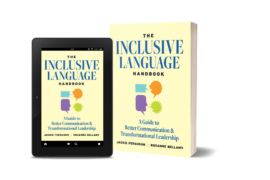With diversity, equity, and inclusion initiatives increasing in both prevalence and popularity, the marketplace is quickly becoming flooded with purveyors of diversity training. Sadly, increases in quantity are often accompanied by corresponding decreases in quality, and not every operation professing to deliver the essentials of diversity is adequately equipped to steer your organization along a steady path that leads toward inclusiveness.
While targeted diversity training that focuses on quality outcomes is essential, research conducted by Harvard Business Review has unearthed problems that are created when diversity training is insufficient, inadequate, or relies on negative messaging during the delivery of the training. Clearly, diversity needs to be administered responsibly if it is going to have the desired effect.
In light of this, here are four guiding principles you should implement when searching for the right diversity training program for your company.
Look for companies with ongoing support and resources
One of the most important parts of choosing a partner is finding one who has the knowledge and experience to lead your initiatives properly. There are many companies doing great work, yet, it’s critical to evaluate those providing the training to make sure it’s the right fit for you and your organizational goals.
You can start by reviewing free content. If the company regularly generates helpful articles, podcasts, and other thought pieces dealing with issues of diversity that are in support of its curriculum, that shows the company believes in its mission and will continually help you educate your employees through additional training and information.
In addition, if the company continues to engage with your organization and offers to provide additional support to assist with the integration of the diversity programming within your workforce, you’ll know that you have a partner that is willing to assist your business and your employees long after the course-completion certificates have been awarded.
Do a thorough search for companies providing DEI training
One of the first things to consider in your search is who will be conducting the training. Are they certified by a reputable accreditation? How many years of experience does the team have working in the space? A review of the backgrounds, experiences, education, and other clients will help you determine if a company is a good fit for your organization.
Evaluating what those clients had to say is also an important part of the review process. Read the reviews from those who have taken the training or worked with the diversity provider previously. If they’re not available publicly, ask to speak with current or past clients to get a sense of the organization’s style and content.
But don’t just stop with clients. Take a look at social media platforms like LinkedIn and Facebook, or call users of those companies’ course offerings and ask if they would recommend them or not. Either way, take your time, get to know the people you plan to trust with your company’s training, and only finalize your contract with them once you are sure that they can deliver exactly what you need.
Evaluate the technology
Once you have your short-list of vetted providers, it’s time to inspect the technology or software they use to deliver their DEI curriculums. While education quality is of critical importance, the process of delivering that education is of similar significance. The ease with which the information can be absorbed, internalized, and retained may rest with the quality of the medium used to deliver that information.
If possible, test their software and determine whether or not it will be an engaging way to deliver the information your workers require. Look for a free sample course. This signals the provider is confident in the materials and delivery. Form a small committee to review the course sample to make sure it’s a good fit for your broader team. From there, you will be able to make an informed decision, confident in the utility of the system the diversity instructors will be using.
Make sure the training encompasses different perspectives and definitions of diversity
Frequently, diversity and inclusion training programs focus an overwhelming portion of their time and energy on unconscious bias or racial diversity. While these are critical aspects of DEI programs and should certainly be addressed, they only scratch the surface in terms of the types of bias that exist in the workplace, and the forms of diversity that organizations should understand.
Aside from race-related diversity, there are several other elements of diversity that should be addressed, including, but not limited to, ethnicity, gender identity, sexual orientation, religious affiliation, disability, and veteran status.
Companies that only address a single facet of diversity through DEI training are the recipients of an incomplete education, and are not being immersed in the full range of valuable subject matter. Before you sign on the dotted line, make sure the diversity educators you are considering doing business with are capable of providing your team with an all-encompassing education that is preparing them for every circumstance they may encounter.






